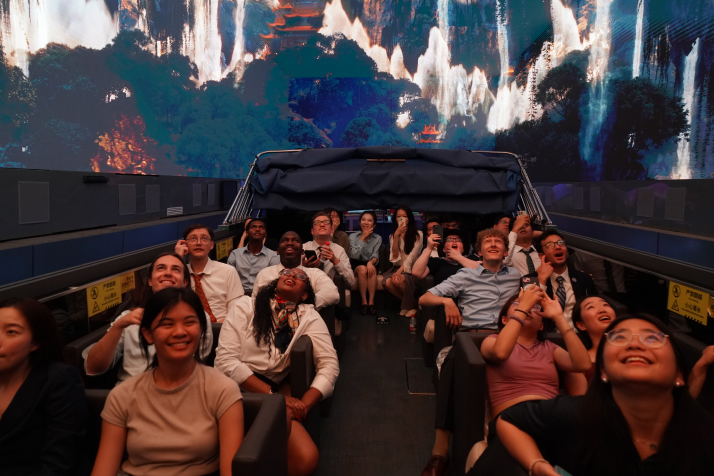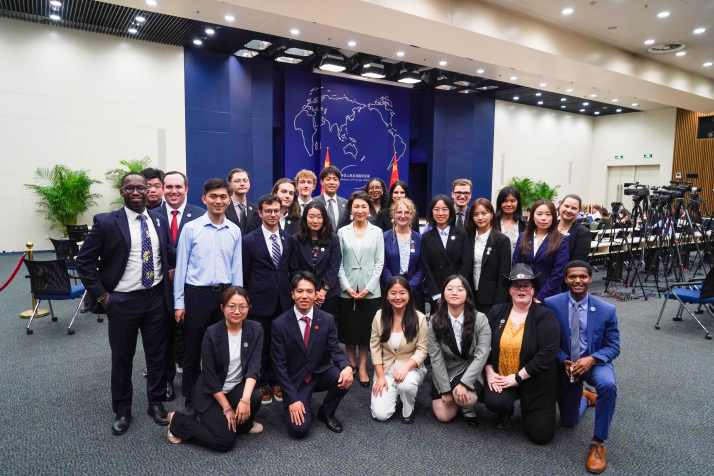| World |
| Chinese and U.S. youth build heart-to-heart connections across the Pacific | |
|
|
|
|
|
In this time of uncertainty in China-U.S. relations, what role can young people play in building mutual trust between their two countries? From July 7 to 23, a delegation of 25 young participants—including 10 from China, 14 from the U.S. and one from Canada—set out to explore this question together.
As participants in the Across the Pacific: China-U.S. Youth Dialogue for a Shared Future program, these students traveled to Beijing, Xi'an in Shaanxi Province, Suzhou in Jiangsu Province and Shanghai to learn more about various aspects of China together and engage in dialogue on related themes. In Suzhou, they attended the Future China-U.S. Diplomats Summer Camp. The program was not only an academic exchange, but also a form of people-to-people diplomacy. "A lot of people think that because we're a China-U.S. conference, we're focused on international relations or policies. But the true mission of this conference is people-to-people exchange and heart-to-heart connection," Kiran Alexis Nieves-Noel, Chair of the Executive Committee for the Fifth China-America Student Conference (ChASC5)—a student-led initiative under the U.S.-based International Student Conferences (ISC)—and a student at East Tennessee State University, told Beijing Review. The youth delegation was selected and organized, and the itinerary was designed by ChASC5. Today, the ISC runs three flagship programs: the Japan-America Student Conference (founded in 1934), the Korea-America Student Conference (established in 2008) and ChASC, launched in 2020 and first held in 2021. This year, the annual program is co-hosted by the China International Communications Group (CICG) Center for the Americas, the ISC and Xi'an Jiaotong-Liverpool University (XJTLU), with support from Xi'an Jiaotong University (XJTU). Its mission is to strengthen people-to-people ties, promote dialogue and lay a stronger foundation for long-term bilateral relations through direct youth engagement. "I believe it's important for young people to approach international exchange with respect and curiosity. Through this, they build personal understanding and relationships that, in turn, help strengthen ties between countries—not just at the government level, but also in the private sector," Kurt Tong, former U.S. Consul General and Chief of Mission in Hong Kong and Macao and Chair of the Executive Committee of the ISC Board, told Beijing Review. Engaging in direct conversations with peers from other cultures is one of the most effective ways to understand different perspectives, according to Tong. "It allows you to not only share your own views, but also truly learn about others and how they see the world," he continued. At the opening ceremony on July 8, Tong shared his personal experience of participating in the Japan-America Student Conference in 1984 and 1985. He recalled that some of his most enduring friendships were formed during that time and expressed confidence that ChASC would serve as a meaningful milestone in the lives of today's youth—opening the door to lasting connections.  Chinese and U.S. youth delegates enjoy a boat ride on the Liangma River in Beijing on July 10 (YIN KANG)
A diverse series of visits The delegation visited Chinese foreign affairs institutions, enterprises, industrial parks, U.S. diplomatic missions in China, as well as international organization offices. On July 11, they sat in on a press briefing at the Ministry of Foreign Affairs, hosted by spokesperson Mao Ning. After wrapping up the event, Mao joined the group for an open, face-to-face conversation. "When Ms. Mao walked toward us, I was genuinely thrilled," Gina Egito, a computer science major from West Chester University in Pennsylvania, recalled. She had chosen her seat carefully to observe and take notes. Mao shared a group photo of her with the delegates on her official X account, captioning it, "A delightful chat with American and Chinese college students!" At the World Food Programme (WFP) China office, discussions turned to pressing global issues, including food security and cooperation between countries of the Global South. "I think it's really interesting to see that developing countries collaborate for their shared interest, for their shared problems, because it showcases a sense of camaraderie of being together. And I'm really impressed by the intellectual sharing that China has done, particularly in Africa. So I'm really impressed with the WFP and their commitment to sustainable learning, intellectual sharing and making sure it's accessible, because that's going to make their solutions long term," Nieves-Noel said. At the U.S. Embassy in Beijing and U.S.-China Business Council's Shanghai Office, the students engaged in constructive conversations about the role youth can play in improving bilateral ties and mutual understanding. Their visits to tech giants Tencent and Xiaomi in Beijing brought the Chinese tech industry to life. For example, at Tencent, the delegates explored AI-driven tools and cutting-edge platforms like AI assistant Tencent Yuanbao and the 3D model generator Hunyuan3D. "That's something you can't truly learn from a textbook or a class—you have to be here, see it with your own eyes. It's definitely been an eye-opening experience," Erik Michael Larson, an undergraduate from Indiana University Bloomington, said after a ride in a Xiaomi electric vehicle. The program also gave students a taste of everyday life in Beijing—from a boat ride down the gleaming Liangma River in the city center to the lively atmosphere of the Lotus Market, an entertainment precinct known for its views of the lotus flowers in central Beijing's Shichahai Lake. "When I think about China from what I've learned in class, it's mostly about special holidays or cultural events. But you don't really get to see what daily life is like. Experiencing it firsthand here has been a completely different perspective," Larson said. Cultural immersion was just as impactful. The delegates not only observed but also tried on hanfu (the traditional attire of the Han Chinese) and were then transported back thousands of years in time. Wearing the traditional attire, the delegates visited the Giant Wild Goose Pagoda, a famous ancient Tang Dynasty (618-907) Buddhist tower in Xi'an, where they experienced the integration of ancient heritage and contemporary life. "I like to think of myself as some sort of lead warrior, but also someone well-versed in ancient philosophies—so a balance between a thinker and a warrior for sure. With the hanfu, I felt more connected to Chinese culture because I was in a costume that represented an ancient period of China. With that type of clothing on, I felt like it channeled a different kind of energy that made me feel more connected to the actual landmark," Justin Welch, a master's student in technology management at New York University, said.  Foreign Ministry spokesperson Mao Ning (center) joins Chinese and U.S. youth delegates for a face-to-face discussion after they sat in on a press briefing at the Blue Hall of the ministry on July 11 (YIN KANG)
A series of in-depth dialogues During the two China-U.S. student dialogues held at China Agricultural University and XJTU, young people from both countries focused on topics such as China's rural development, historical and cultural heritage, and international education. After a lecture that offered a comprehensive look at Chinese culinary culture at XJTU, Dahlia Townley-Bakewell, an undergraduate student from Indiana University Bloomington, shared her reflections. "This lecture got me thinking about things I'd never really considered before—like why Chinese dining tables are round. I used to think it was just to make it easier to share dishes. And that does make sense if everyone is sharing food. But I hadn't realized there's a deeper meaning. It is about reunion, about everyone being equal at the table. Everything is connected to everything else, which come together to form a whole system.I found that really fascinating," she said. At the China-U.S. Future Diplomats Summer Camp in Suzhou, more than 70 Chinese and American university students were divided into three simulation sessions—China-U.S. Economic and Trade Negotiations, China-U.S. Negotiations on AI and China-U.S. Negotiations on Environment. The camp concluded with the adoption and signing of the Youth Declaration of the China-U.S. Future Diplomats Summer Camp. "I really enjoyed and appreciated how intentional, substantive and kind the dialogue was. No one was necessarily super aggressive or argumentative. And we were really able to just come together as people and work out our differences to come up with a really substantive final result," Michael Buzzy, a Ph.D. student at Wayne State University Law School, said. "We Chinese delegates may assume roles representing China or portray American counterparts. Likewise, American delegates can advocate on behalf of China. This role-exchange mechanism enables delegates during preparation to deepen their understanding of current bilateral challenges and identify necessary actions to achieve mutually beneficial collaborative goals," Liu Yuxuan, an undergraduate student majoring in international relations at XJTLU, said. At the China Institute of Fudan University, Professor Zhang Weiwei, a prominent scholar of international relations, delivered a keynote speech titled The China Model and China-U.S. Relations. He also addressed questions from the Chinese and American student delegations on a range of topics, including China's practice of meritocratic governance, mechanisms for China-U.S. youth exchange and cooperation, the tension between international relations theory and reality, China's strategic response to the trade war, and his expectations for the next generation of China-U.S. diplomats. Youth connections Communication is key to breaking down barriers, fostering mutual understanding and building genuine connections that transcend time, distance and national borders, Li Yafang, CICG Deputy Editor in Chief, said at the program's opening ceremony on July 8. "I believe this shared journey will plant seeds of friendship in each of you. One day, they will blossom into great friendship across the Pacific, enduring bonds that unite our nations and shape our shared future," she added. At the opening ceremony, Victor Gao, Vice President of the Center for China and Globalization, a think tank based in China, welcomed the arrival of the American youth delegation. "I'm so happy to see you, the representatives of younger people in the United States, coming to see China with your own eyes," he said. "We should always remain brothers and sisters. We want to build our common future, not only for China and the United States, but also for humanity as a whole." CICG Vice President Yu Yunquan said at the opening ceremony that while China-U.S. relations have experienced ups and downs over the years, young people on both sides have consistently brought warmth and hope to the bilateral relationship. He emphasized that the world is entering a period of heightened uncertainty and transformation, with history once again standing at a crossroads—making dialogue among youth more important than ever. "The future is full of unknowns—and possibilities," Yu said. "I hope young people will remain open-minded and inclusive, committed to cooperation and mutual benefit. By bridging differences in language and culture, you can stand together and contribute your strength to the peace and prosperity of both our nations—and the world at large." In his remarks at the closing ceremony on July 22, Eric Zheng, President of the American Chamber of Commerce in Shanghai, acknowledged that today's geopolitical tensions have become a major concern for many. However, he emphasized that youth exchange is key to overcoming misunderstandings. "Over the past 17 days, you traveled across Beijing, Xi'an, Suzhou and Shanghai, and through dialogue, you discovered more similarities than differences," he said. "This kind of cross-border engagement is the first step toward rebuilding trust between China and the United States," he stressed, adding that the younger generation should move beyond narratives of competition and instead seek new opportunities for cooperation on global issues such as climate change and public health. (Print Edition Title: A Rising Tide Lifts All Boats) Copyedited by G.P. Wilson Comments to taoxing@cicgamericas.com |
|
||||||||||||||||||||||||||||
|